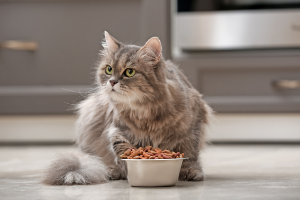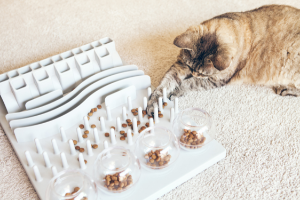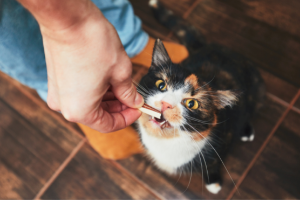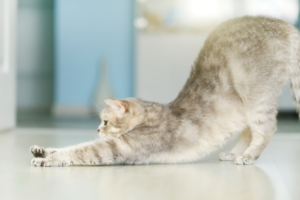Did you know that more than half of the cats in the United States are overweight? That translates to a whopping 56 million American cats who are carrying around more weight than they should. And about 40 percent of them aren’t just overweight; they are obese. While a chunky kitty is undeniably adorable, the excess chub is not good for their health. Like people, obese cats can suffer from health issues like heart disease, arthritis, and diabetes. They can have trouble grooming themselves properly, which can lead to skin problems and trouble defecating normally, leading to constipation. Obesity also increases their risk for certain types of cancer. All in all, overweight cats tend to live shorter lives than their slimmer counterparts.
How you feed your cat is just as important as what you feed them. As veterinarians, we see overweight feline patients every day. And often, their owners have no idea how their furry friend has managed to pack on so much weight. Unfortunately, overfeeding is common and not just with irresponsible and uncaring pet owners. Some of the best and most responsible pet parents make mistakes regarding their cat’s diet. In this article, we will be going over some helpful tips for preventing cat obesity. Let’s get started.
1. Understand Your Cat’s Dietary Needs
Because cats come in all shapes and sizes, there is no specific weight that is healthy for all cats. Instead, veterinarians use a Body Condition Scoring (BCS) system to assess if a cat is at their ideal weight. Ensuring that your cat scores in the healthy range means understanding their dietary needs. Scheduling an appointment with your vet is the best way to get a clear picture of how much and what type of food your cat needs to reach or maintain a healthy weight.

2. Choose High-Quality Food
Feeding your cat the cheapest food on the grocery store shelf is equivalent to feeding your child fast food three times a day rather than making healthy, home-cooked meals. While you don’t necessarily need to purchase the most expensive food on the market, it is essential to choose a product that meets your cat’s nutritional needs and isn’t loaded with fillers. Be sure to select a formula that is appropriate for their life stage, too. If you’d like a more specific recommendation, your vet will be happy to help you with that.
3. Ditch the All-Day Buffet
If you leave out a large bowl that provides your cat with constant access to food, it may be time to change up your feeding routine. Although it’s convenient, free-feeding is a huge contributing factor to obesity in cats. It is a common misconception that cats know when to stop eating and will not overindulge. In reality, providing easy access to food at all times is a great way to help your cat pack on extra pounds. Scheduled meal times are much better for your furry friend.

4. Engage Your Cat’s Natural Instincts
In the wild, cats spend about 80 percent of their waking hours searching and hunting for food. They usually eat several small meals throughout the day, and each meal is the reward for a successful hunt. Nothing about eating out of a giant bowl that’s always in the same spot on the kitchen floor engages your cat’s instincts. Instead, break their day’s food up into several smaller meals, and put them in various places throughout your home. Kitty will enjoy the challenge of a “hunt,” and they will get some much-needed exercise. Place the food in elevated places to encourage jumping and climbing. Consider feeding out of a food-dispensing toy to mimic working for their food.
5. Switch to Canned Food
If you are currently feeding your cat dry kibble, switching to canned food may be a good idea. Canned food encourages “meal feeding” and is a good option when trying to transition your feline friend away from free feeding. Plus, canned food is usually lower in carbohydrates and higher in protein than kibble, making it a healthier option that is less likely to make your cat pack on excess weight. Ask your veterinarian about the right food for your cat.

6. Stop Being an Automatic Treat Dispenser
Do you give in every time your cat meows at you for a snack? If so, it is time to stop being an automatic treat dispenser. While you may feel like giving treats is an excellent way to show your cat how much you love them, doing so could negatively impact their health. Just like people, cats gain weight when their diet is filled with too many calories. The next time your cat is begging for treats, reward them with a play session or some head scratches instead.
7. Monitor Your Cat’s Weight
Because you see your cat every day, it can be difficult to detect changes in their appearance. And it is tough to tell if a long-haired cat you see daily has gained a pound or two. That is why it is essential to weigh your cat at least every couple of months. Keeping a close eye on your cat’s weight allows you to detect any troublesome changes and work toward solving the problem before it becomes serious. You can purchase a “baby scale” for at-home use or try using your bathroom scale. Even a few ounces of weight gain can be significant for these tiny creatures.

8. Encourage Exercise
Laziness is a major contributing factor to obesity in housecats. After all, they don’t need to hunt for their food, so cats commonly transform from prowling predators into couch potatoes. To prevent obesity, engage your cat in several short play sessions throughout the day.
Playing with your cat helps with the following:
- It burns calories
- It relieves boredom
- It promotes human/kitty bonding
- It stimulates cats' minds
- Some toys can channel kitties' natural hunting instincts, which they love
- It keeps cats in good physical condition
9. Schedule Routine Wellness Exams
Even if your cat seems perfectly healthy, it’s crucial to schedule routine wellness exams with their veterinarian. Although many cats are afflicted by conditions that contribute to weight gain, they may not exhibit any symptoms. Not showing signs of illness is particularly true of cats, who tend to hide when they are in pain or suffering. A vet can detect these issues through routine bloodwork and begin the appropriate course of treatment. Annual wellness exams also provide an opportunity for a vet to spot other signs of trouble and provide guidance regarding your pet’s weight and nutritional needs.
"All the more to love!" you jokingly tell others about your cat, and we veterinarians know that "chonky bois" are charming. The harsh truth is you could be contributing to shortening your cat’s life by not facing the problem, as excess weight puts their health at risk. If you have other family members, give everyone a role in ensuring that your cat doesn’t get too many treats, consumes a healthy diet, and gets enough exercise. The tips listed above are a great place to start, but if you need additional help with preventing obesity or helping your feline friend lose weight, please call now to schedule an appointment.
